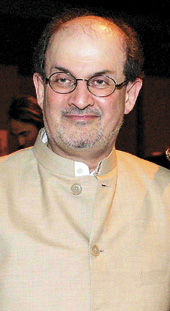 |
| Salman Rushdie |
New York, Nov. 5 (Reuters): Based on a book that Salman Rushdie wrote while he was still under threat of death, a new opera Haroun and the Sea of Stories is a fable about free speech that its creators say speaks straight to the post-September 11 world.
The opera, which premiered this week in New York, is about 11-year-old Haroun and his father Rashid, a story-teller whose stories run dry when his wife leaves him and his son asks the question: ?What?s the use of stories that aren?t even true??
Rushdie started writing Haroun... in 1989, just after Iran?s Ayatollah Khomeini had issued a fatwa, or decree, instructing Muslims to kill the author because of his book The Satanic Verses, which Iran?s clerics deemed blasphemous.
?Before, for most of us, the threats that underlie the book were abstract,? composer Charles Wuorinen says. ?All of a sudden, we were brought into direct confrontation with the same enemy that Salman had had all these years.?
Wuorinen decided to make an opera out of Rushdie?s most accessible novel a decade ago.
Completed in 2001, the show was delayed by financial problems after the September 11 attacks.
?During the time it has taken to write first the novel and then the opera, and to bring it to the stage, the world in which it was written has markedly changed,? says James Fenton, the British poet who adapted the book for the libretto.
The story pits Haroun against the villain Khattam-Shud who rules over a silent land and tries to poison the Sea of Stories. ?Inside every single story there lies a world, a story world, that I cannot rule at all,? the tyrant sings.
In the book Haroun makes a fantastic journey to the moon of Kahani, he finds the Great Story Sea populated by Plentimaw fish, a water genie who can turn on and off the tap of stories, and a princess whose singing is so terrible that her people hesitate to rescue her at the crucial moment.
The wildly colourful costumes and surreal projections that take the place of scenery give the opera a cinematic feel, as does the pace of the action, with 17 scenes in the first act.
Some critics marked down the music as overly complex, but the witty dialogue drew frequent laughs and wit also permeates the score ? when Haroun and his sidekicks ride to the rescue we hear a few bars of Wagner?s Ride of the Valkyries.
?I?ve been told there were a number of children who not only managed to survive the first act which is quite long but came back for more and were delighted by it,? Wuorinen said.
Rushdie said it was not the first time he had seen Haroun... on stage ? it has been a play in London and produced in a puppet version in Europe.
?There?s an animation feature in the works,? Rushdie said. ?I?m just happy that this book seems to make people want to do things with it.?










